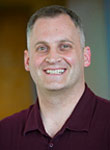Faculty and staff support program partners with Gannett
By Nancy Doolittle

The Faculty and Staff Assistance Program (FSAP) is partnering with Gannett Health Services to provide professional consultation and referral services to all Cornell faculty, staff, postdocs, visiting scholars and retirees, said Gregory Eells, director of counseling and psychological services at Gannett and now also director of the FSAP.
Relocated to 409 College Ave., the FSAP offers free and confidential guidance and support to help with a wide range of personal and professional issues, life stresses and mental health concerns. These range from crises to supporting people with new and challenging life experiences, such as newcomers seeking to build a social network, veterans and/or families of veterans dealing with challenges of re-entering civilian life, and faculty members as they go through the tenure process.
"Whatever the stressor, whether something in your work site or department, a financial or legal concern, caregiving for an aging parent or dealing with grief -- or whether you just need help clarifying an important life decision, adjusting to a health challenge or improving family communication -- call 255-2673, and the FSAP can help you deal with it," said Eells.
Faculty and Staff Assistance Program
409 College Ave., Suite 201
Ithaca, NY 14850
Monday-Friday, 8:30 a.m.-5 p.m.
Phone 607-255-2673 (COPE) to schedule appointments; available 24/7 for urgent concerns.
Learn more: http://www.fsap.cornell.edu
Confidential in-person and phone appointments are available with dedicated FSAP counselors Jim Morris and Cindy Glanville during workdays. When urgent concerns arise after hours or on weekends, employees can call FSAP for a confidential conversation with a member of Gannett's on-call staff.
"Gannett's partnership with the FSAP helps the university to better meet the diverse needs of the entire Cornell community," Eells said. "Those who call the FSAP, at any time, day or night, will talk with someone from Cornell who is both experienced in dealing with confidential matters and familiar with the university's culture and policies and with local area providers." The search for an assistant director to oversee day-to-day operations of the FSAP is under way.
Noted Linda Croll Howell, director of worklife services in the Division of Human Resources and Safety Services, "Given the tremendous expertise and comprehensive approach to mental health Gannett already has in place for students, it made sense for Gannett to also take the lead in developing and running the support system for faculty, staff and other members of the Cornell community."
Eells said that the partnership between Gannett and the FSAP grew out of Cornell's broad commitment to foster and support the mental health and well-being of the campus community, and will better coordinate efforts to cope with public crises, such as unexpected deaths. "Because of the close-knit nature of the Cornell and Ithaca communities, almost any crisis that impacts one segment of the Cornell community impacts the others. If a student or faculty member passes away, that impacts not just other students or faculty members, but also staff members who knew that person," he said.
In the case of a campus crisis, some 40 mental health professionals are available to respond and be part of a larger effort to address the full range of emotional and mental health needs that may surface.
"The FSAP can serve as an entry point to the many services that the university makes available. It provides one more way for the university to build a 'caring community' through a comprehensive approach to the well-being of all members of the Cornell community," Eells said.
Media Contact
Get Cornell news delivered right to your inbox.
Subscribe